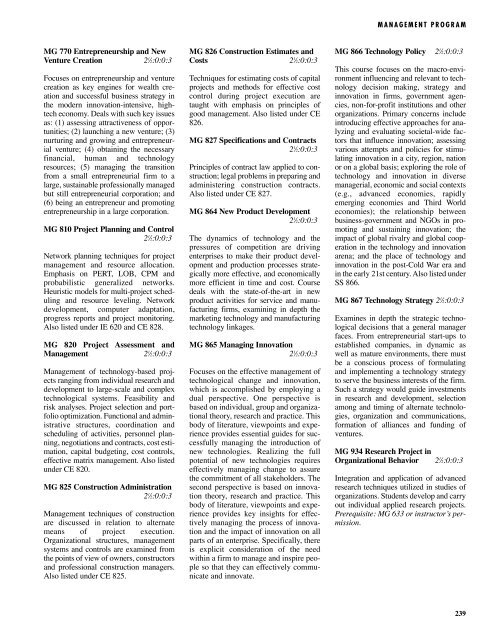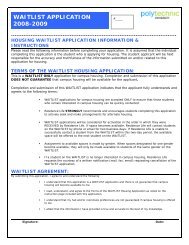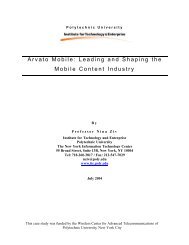POLYTECHNIC UNIVERSITY 2005-2007
POLYTECHNIC UNIVERSITY 2005-2007
POLYTECHNIC UNIVERSITY 2005-2007
Create successful ePaper yourself
Turn your PDF publications into a flip-book with our unique Google optimized e-Paper software.
MANAGEMENT PROGRAM<br />
MG 770 Entrepreneurship and New<br />
Venture Creation 2 1 ⁄2:0:0:3<br />
Focuses on entrepreneurship and venture<br />
creation as key engines for wealth creation<br />
and successful business strategy in<br />
the modern innovation-intensive, hightech<br />
economy. Deals with such key issues<br />
as: (1) assessing attractiveness of opportunities;<br />
(2) launching a new venture; (3)<br />
nurturing and growing and entrepreneurial<br />
venture; (4) obtaining the necessary<br />
financial, human and technology<br />
resources; (5) managing the transition<br />
from a small entrepreneurial firm to a<br />
large, sustainable professionally managed<br />
but still entrepreneurial corporation; and<br />
(6) being an entrepreneur and promoting<br />
entrepreneurship in a large corporation.<br />
MG 810 Project Planning and Control<br />
2 1 ⁄2:0:0:3<br />
Network planning techniques for project<br />
management and resource allocation.<br />
Emphasis on PERT, LOB, CPM and<br />
probabilistic generalized networks.<br />
Heuristic models for multi-project scheduling<br />
and resource leveling. Network<br />
development, computer adaptation,<br />
progress reports and project monitoring.<br />
Also listed under IE 620 and CE 828.<br />
MG 820 Project Assessment and<br />
Management 2 1 ⁄2:0:0:3<br />
Management of technology-based projects<br />
ranging from individual research and<br />
development to large-scale and complex<br />
technological systems. Feasibility and<br />
risk analyses. Project selection and portfolio<br />
optimization. Functional and administrative<br />
structures, coordination and<br />
scheduling of activities, personnel planning,<br />
negotiations and contracts, cost estimation,<br />
capital budgeting, cost controls,<br />
effective matrix management. Also listed<br />
under CE 820.<br />
MG 825 Construction Administration<br />
2 1 ⁄2:0:0:3<br />
Management techniques of construction<br />
are discussed in relation to alternate<br />
means of project execution.<br />
Organizational structures, management<br />
systems and controls are examined from<br />
the points of view of owners, constructors<br />
and professional construction managers.<br />
Also listed under CE 825.<br />
MG 826 Construction Estimates and<br />
Costs 2 1 ⁄2:0:0:3<br />
Techniques for estimating costs of capital<br />
projects and methods for effective cost<br />
control during project execution are<br />
taught with emphasis on principles of<br />
good management. Also listed under CE<br />
826.<br />
MG 827 Specifications and Contracts<br />
2 1 ⁄2:0:0:3<br />
Principles of contract law applied to construction;<br />
legal problems in preparing and<br />
administering construction contracts.<br />
Also listed under CE 827.<br />
MG 864 New Product Development<br />
2 1 ⁄2:0:0:3<br />
The dynamics of technology and the<br />
pressures of competition are driving<br />
enterprises to make their product development<br />
and production processes strategically<br />
more effective, and economically<br />
more efficient in time and cost. Course<br />
deals with the state-of-the-art in new<br />
product activities for service and manufacturing<br />
firms, examining in depth the<br />
marketing technology and manufacturing<br />
technology linkages.<br />
MG 865 Managing Innovation<br />
2 1 ⁄2:0:0:3<br />
Focuses on the effective management of<br />
technological change and innovation,<br />
which is accomplished by employing a<br />
dual perspective. One perspective is<br />
based on individual, group and organizational<br />
theory, research and practice. This<br />
body of literature, viewpoints and experience<br />
provides essential guides for successfully<br />
managing the introduction of<br />
new technologies. Realizing the full<br />
potential of new technologies requires<br />
effectively managing change to assure<br />
the commitment of all stakeholders. The<br />
second perspective is based on innovation<br />
theory, research and practice. This<br />
body of literature, viewpoints and experience<br />
provides key insights for effectively<br />
managing the process of innovation<br />
and the impact of innovation on all<br />
parts of an enterprise. Specifically, there<br />
is explicit consideration of the need<br />
within a firm to manage and inspire people<br />
so that they can effectively communicate<br />
and innovate.<br />
MG 866 Technology Policy 2 1 ⁄2:0:0:3<br />
This course focuses on the macro-environment<br />
influencing and relevant to technology<br />
decision making, strategy and<br />
innovation in firms, government agencies,<br />
non-for-profit institutions and other<br />
organizations. Primary concerns include<br />
introducing effective approaches for analyzing<br />
and evaluating societal-wide factors<br />
that influence innovation; assessing<br />
various attempts and policies for stimulating<br />
innovation in a city, region, nation<br />
or on a global basis; exploring the role of<br />
technology and innovation in diverse<br />
managerial, economic and social contexts<br />
(e.g., advanced economies, rapidly<br />
emerging economies and Third World<br />
economies); the relationship between<br />
business-government and NGOs in promoting<br />
and sustaining innovation; the<br />
impact of global rivalry and global cooperation<br />
in the technology and innovation<br />
arena; and the place of technology and<br />
innovation in the post-Cold War era and<br />
in the early 21st century. Also listed under<br />
SS 866.<br />
MG 867 Technology Strategy 2 1 ⁄2:0:0:3<br />
Examines in depth the strategic technological<br />
decisions that a general manager<br />
faces. From entrepreneurial start-ups to<br />
established companies, in dynamic as<br />
well as mature environments, there must<br />
be a conscious process of formulating<br />
and implementing a technology strategy<br />
to serve the business interests of the firm.<br />
Such a strategy would guide investments<br />
in research and development, selection<br />
among and timing of alternate technologies,<br />
organization and communications,<br />
formation of alliances and funding of<br />
ventures.<br />
MG 934 Research Project in<br />
Organizational Behavior 2 1 ⁄2:0:0:3<br />
Integration and application of advanced<br />
research techniques utilized in studies of<br />
organizations. Students develop and carry<br />
out individual applied research projects.<br />
Prerequisite: MG 633 or instructor’s permission.<br />
239




